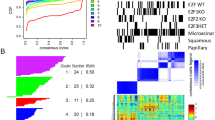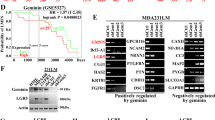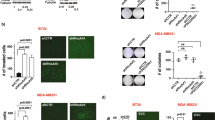Abstract
The loss of expression of the transcription factor GATA3 in breast tumors has been linked to aggressive tumor development and poor patient survival. In the present work, we address potential roles for GATA3 in breast tumor lung metastasis and progression. Using an aggressive breast cancer cell line, which metastasizes specifically to the lung, we show that GATA3 expression results in reduced tumor outgrowth in the mammary fat pad and lower lung metastatic burden in nude mice. Specifically, GATA3 expression inhibits breast cancer cell expansion inside the lung parenchyma. This phenotype correlates with the ability of GATA3 to negatively regulate the expression of several genes that promote breast cancer lung metastasis (ID1/-3, KRTHB1, LY6E and RARRES3). Conversely, the expression of genes encoding known inhibitors of lung metastasis (DLC1 (deleted in liver cancer 1) and PAEP (progestagen-associated endometrial protein)) is upregulated by GATA3. These data correlate with microarray data from human breast cancer patients, showing a strong correlation between high GATA3 expression and absence of metastases specifically to the lungs. We conclude that GATA3 inhibits primary breast tumor outgrowth and reduces lung metastatic burden by regulating key genes involved in metastatic breast tumor progression.
This is a preview of subscription content, access via your institution
Access options
Subscribe to this journal
Receive 50 print issues and online access
$259.00 per year
only $5.18 per issue
Buy this article
- Purchase on Springer Link
- Instant access to full article PDF
Prices may be subject to local taxes which are calculated during checkout






Similar content being viewed by others

Abbreviations
- ER:
-
estrogen receptor-α
References
Asselin-Labat ML, Sutherland KD, Barker H, Thomas R, Shackleton M, Forrest NC et al. (2006). Gata-3 is an essential regulator of mammary-gland morphogenesis and luminal-cell differentiation. Nat Cell Biol 9: 201–209.
Buess M, Nuyten DS, Hastie T, Nielsen T, Pesich R, Brown PO . (2007). Characterization of heterotypic interaction effects in vitro to deconvolute global gene expression profiles in cancer. Genome Biol 8: R191.
de Kok JB, Roelofs RW, Giesendorf BA, Pennings JL, Waas ET, Feuth T et al. (2005). Normalization of gene expression measurements in tumor tissues: comparison of 13 endogenous control genes. Lab Invest 85: 154–159.
Desmedt C, Piette F, Loi S, Wang Y, Lallemand F, Haibe-Kains B et al. (2007). Strong time dependence of the 76-gene prognostic signature for node-negative breast cancer patients in the TRANSBIG multicenter independent validation series. Clin Cancer Res 13: 3207–3214.
Eeckhoute J, Keeton EK, Lupien M, Krum SA, Carroll JS, Brown M . (2007). Positive cross-regulatory loop ties GATA-3 to estrogen receptor alpha expression in breast cancer. Cancer Res 67: 6477–6483.
Goodison S, Yuan J, Sloan D, Kim R, Li C, Popescu NC et al. (2005). The RhoGAP protein DLC-1 functions as a metastasis suppressor in breast cancer cells. Cancer Res 65: 6042–6053.
Grote D, Souabni A, Busslinger M, Bouchard M . (2006). Pax 2/8-regulated Gata 3 expression is necessary for morphogenesis and guidance of the nephric duct in the developing kidney. Development 133: 53–61.
Gupta GP, Massague J . (2006). Cancer metastasis: building a framework. Cell 127: 679–695.
Gupta GP, Nguyen DX, Chiang AC, Bos PD, Kim JY, Nadal C et al. (2007a). Mediators of vascular remodelling co-opted for sequential steps in lung metastasis. Nature 446: 765–770.
Gupta GP, Perk J, Acharyya S, de Candia P, Mittal V, Todorova-Manova K et al. (2007b). ID genes mediate tumor reinitiation during breast cancer lung metastasis. Proc Natl Acad Sci USA 104: 19506–19511.
Hautala LC, Koistinen R, Seppala M, Butzow R, Stenman UH, Laakkonen P et al. (2008). Glycodelin reduces breast cancer xenograft growth in vivo. Int J Cancer 123: 2279–2284.
Ivshina AV, George J, Senko O, Mow B, Putti TC, Smeds J et al. (2006). Genetic reclassification of histologic grade delineates new clinical subtypes of breast cancer. Cancer Res 66: 10292–10301.
Jemal A, Siegel R, Ward E, Hao Y, Xu J, Murray T et al. (2008). Cancer statistics, 2008. CA Cancer J Clin 58: 71–96.
Jeschke U, Mylonas I, Kunert-Keil C, Dazert E, Shabani N, Werling M et al. (2005). Expression of glycodelin protein and mRNA in human ductal breast cancer carcinoma in situ, invasive ductal carcinomas, their lymph node and distant metastases, and ductal carcinomas with recurrence. Oncol Rep 13: 413–419.
Johnston SRD, Swanton C . (2006). Handbook of Metastatic Breast Cancer 8th edn Informa Healthcare: London, pp 232.
Kang Y, Siegel PM, Shu W, Drobnjak M, Kakonen SM, Cordon-Cardo C et al. (2003). A multigenic program mediating breast cancer metastasis to bone. Cancer Cell 3: 537–549.
Kouros-Mehr H, Bechis SK, Slorach EM, Littlepage LE, Egeblad M, Ewald AJ et al. (2008a). GATA-3 links tumor differentiation and dissemination in a luminal breast cancer model. Cancer Cell 13: 141–152.
Kouros-Mehr H, Kim JW, Bechis SK, Werb Z . (2008b). GATA-3 and the regulation of the mammary luminal cell fate. Curr Opin Cell Biol 20: 164–170.
Kouros-Mehr H, Slorach EM, Sternlicht MD, Werb Z . (2006). GATA-3 maintains the differentiation of the luminal cell fate in the mammary gland. Cell 127: 1041–1055.
Lim KC, Lakshmanan G, Crawford SE, Gu Y, Grosveld F, Engel JD . (2000). GATA3 loss leads to embryonic lethality due to noradrenaline deficiency of the sympathetic nervous system. Nat Genet 25: 209–212.
Ma XJ, Salunga R, Tuggle JT, Gaudet J, Enright E, McQuary P et al. (2003). Gene expression profiles of human breast cancer progression. Proc Natl Acad Sci USA 100: 5974–5979.
Mehra R, Varambally S, Ding L, Shen R, Sabel MS, Ghosh D et al. (2005). Identification of GATA3 as a breast cancer prognostic marker by global gene expression meta-analysis. Cancer Res 65: 11259–11264.
Minn AJ, Gupta GP, Siegel PM, Bos PD, Shu W, Giri DD et al. (2005). Genes that mediate breast cancer metastasis to lung. Nature 436: 518–524.
Murphy KM . (2005). Fate vs choice: the immune system reloaded. Immunol Res 32: 193–200.
Ni H, Dydensborg AB, Herring FE, Basora N, Gagne D, Vachon PH et al. (2005). Upregulation of a functional form of the beta4 integrin subunit in colorectal cancers correlates with c-Myc expression. Oncogene 24: 6820–6829.
Oh DS, Troester MA, Usary J, Hu Z, He X, Fan C et al. (2006). Estrogen-regulated genes predict survival in hormone receptor-positive breast cancers. J Clin Oncol 24: 1656–1664.
Parikh P, Palazzo JP, Rose LJ, Daskalakis C, Weigel RJ . (2005). GATA-3 expression as a predictor of hormone response in breast cancer. J Am Coll Surg 200: 705–710.
Patient RK, McGhee JD . (2002). The GATA family (vertebrates and invertebrates). Curr Opin Genet Dev 12: 416–422.
Shabani N, Mylonas I, Kunert-Keil C, Briese V, Janni W, Gerber B et al. (2005). Expression of glycodelin in human breast cancer: immunohistochemical analysis in mammary carcinoma in situ, invasive carcinomas and their lymph node metastases. Anticancer Res 25: 1761–1764.
Solomayer EF, Diel IJ, Meyberg GC, Gollan C, Bastert G . (2000). Metastatic breast cancer: clinical course, prognosis and therapy related to the first site of metastasis. Breast Cancer Res Treat 59: 271–278.
Sorlie T, Perou CM, Tibshirani R, Aas T, Geisler S, Johnsen H et al. (2001). Gene expression patterns of breast carcinomas distinguish tumor subclasses with clinical implications. Proc Natl Acad Sci USA 98: 10869–10874.
Usary J, Llaca V, Karaca G, Presswala S, Karaca M, He X et al. (2004). Mutation of GATA3 in human breast tumors. Oncogene 23: 7669–7678.
van't Veer LJ, Dai H, van de Vijver MJ, He YD, Hart AA, Mao M et al. (2002). Gene expression profiling predicts clinical outcome of breast cancer. Nature 415: 530–536.
van de Vijver MJ, He YD, van't Veer LJ, Dai H, Hart AA, Voskuil DW et al. (2002). A gene-expression signature as a predictor of survival in breast cancer. N Engl J Med 347: 1999–2009.
Voduc D, Cheang M, Nielsen T . (2008). GATA-3 expression in breast cancer has a strong association with estrogen receptor but lacks independent prognostic value. Cancer Epidemiol Biomarkers Prev 17: 365–373.
Wang Y, Klijn JG, Zhang Y, Sieuwerts AM, Look MP, Yang F et al. (2005). Gene-expression profiles to predict distant metastasis of lymph-node-negative primary breast cancer. Lancet 365: 671–679.
Acknowledgements
The authors are grateful to Dr Perou (Division of Cancer Epidemiology and Genetics, the National Cancer Institute, MD 20852-7234, USA) for sharing cDNA constructs. The work was supported by the Canadian Institutes for Health Research grant MOP-84470 and a Canderel New Initiative Award to MB. ABD was supported by a fellowship from the Carlsberg Foundation (2006_01_0102) and a Canadian Institutes for Health Research Cancer Consortium Training Grant Fellowship Award. AANR is supported by a studentship from the Fonds de la Recherche en Santé du Québec. PS is a research scientist of the National Cancer Institute of Canada. MB holds a Canada Research Chair in Developmental Genetics of the Urogenital System.
Author information
Authors and Affiliations
Corresponding author
Additional information
Supplementary Information accompanies the paper on the Oncogene website (http://www.nature.com/onc)
Supplementary information
Rights and permissions
About this article
Cite this article
Dydensborg, A., Rose, A., Wilson, B. et al. GATA3 inhibits breast cancer growth and pulmonary breast cancer metastasis. Oncogene 28, 2634–2642 (2009). https://doi.org/10.1038/onc.2009.126
Received:
Revised:
Accepted:
Published:
Issue Date:
DOI: https://doi.org/10.1038/onc.2009.126
Keywords
This article is cited by
-
Loss of function of GATA3 regulates FRA1 and c-FOS to activate EMT and promote mammary tumorigenesis and metastasis
Cell Death & Disease (2023)
-
Transcriptome profiling and network enrichment analyses identify subtype-specific therapeutic gene targets for breast cancer and their microRNA regulatory networks
Cell Death & Disease (2023)
-
Value of Proline, Glutamic Acid, and Leucine-Rich Protein 1 and GATA Binding Protein 3 Expression in Breast Cancer: An Immunohistochemical study
Indian Journal of Surgery (2023)
-
Genetic, Genomic, and Heritable Components of Benign Prostatic Hyperplasia
Current Bladder Dysfunction Reports (2023)
-
GATA3 and MDM2 are synthetic lethal in estrogen receptor-positive breast cancers
Communications Biology (2022)


